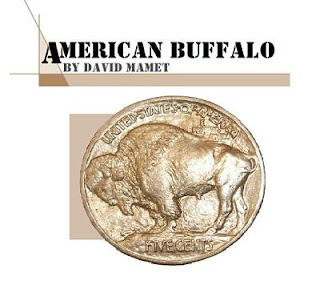
Never having seen a Steppenwolf production, I didn't know what to expect walking through the Old Town theater's front doors. Upon settling myself in my seat and feeling the room go cooler with the blackening of the lights and the immediate silence that followed, I became aware of greatly liking the smaller, modern venue; the lights went up, the actors began speaking, and, to my great surprise, their voices came directly from their mouths instead of from a speaker; there were no mics. An intimate theatre experience. Perfect for the quick, blunt, three-man story told in American Buffalo.

Francis Guinan, Tracy Letts, and Patrick Andrews portray the three diverse characters of Don, Teach, and Bob, each of a different generation: Don is older and, literally, holds onto the past, as the entire play is set in his basement junk shop full of old items. Teach is younger than Don, jaded and experienced, a man of the world. And Bob is naive and trusting, still somewhat of a boy. The story revolves around an American Buffalo coin Don sold for a price significantly less than he believes it to be worth. He then asks Bob, and later Teach, for help in procuring revenge (however unwarrented) on the man who bought the coin from him.
By native Chicagoian playwright David Mamet, playwright also to Pulitzer Prize-winning play Glengarry Glen Ross, the language of American Buffalo is often fast, terse, and vulgar. "Fuck" is thrown around loosely as well as a smattering of other harsh words, and there comes much anger, yelling, and cursing from a frustrated Teach. The use of this type of language seems to be Mamet's way of infusing the characters with a vernacular of the lower or middle classes, and. as it is a play, giving them a chance to voice a kind of profane poetry. Some of the harsh, yet funny and admittedly somewhat true, philosophies spewed by Don and Teach throughout the play that stood out to me were phrases like, "Action talks, bullshit walks!" and "The only way to teach these people is to kill them!"
Also, it's always nice when a play is set in your city; the refereces to Lake Shore Drive and Masonic Hospital, and Chicago-related items strewn about the junk shop set make those of us in the audience -- or, at least, those of us in the audience who love Chicago -- feel a little closer to the characters, the struggles they endure, and the story they tell.











